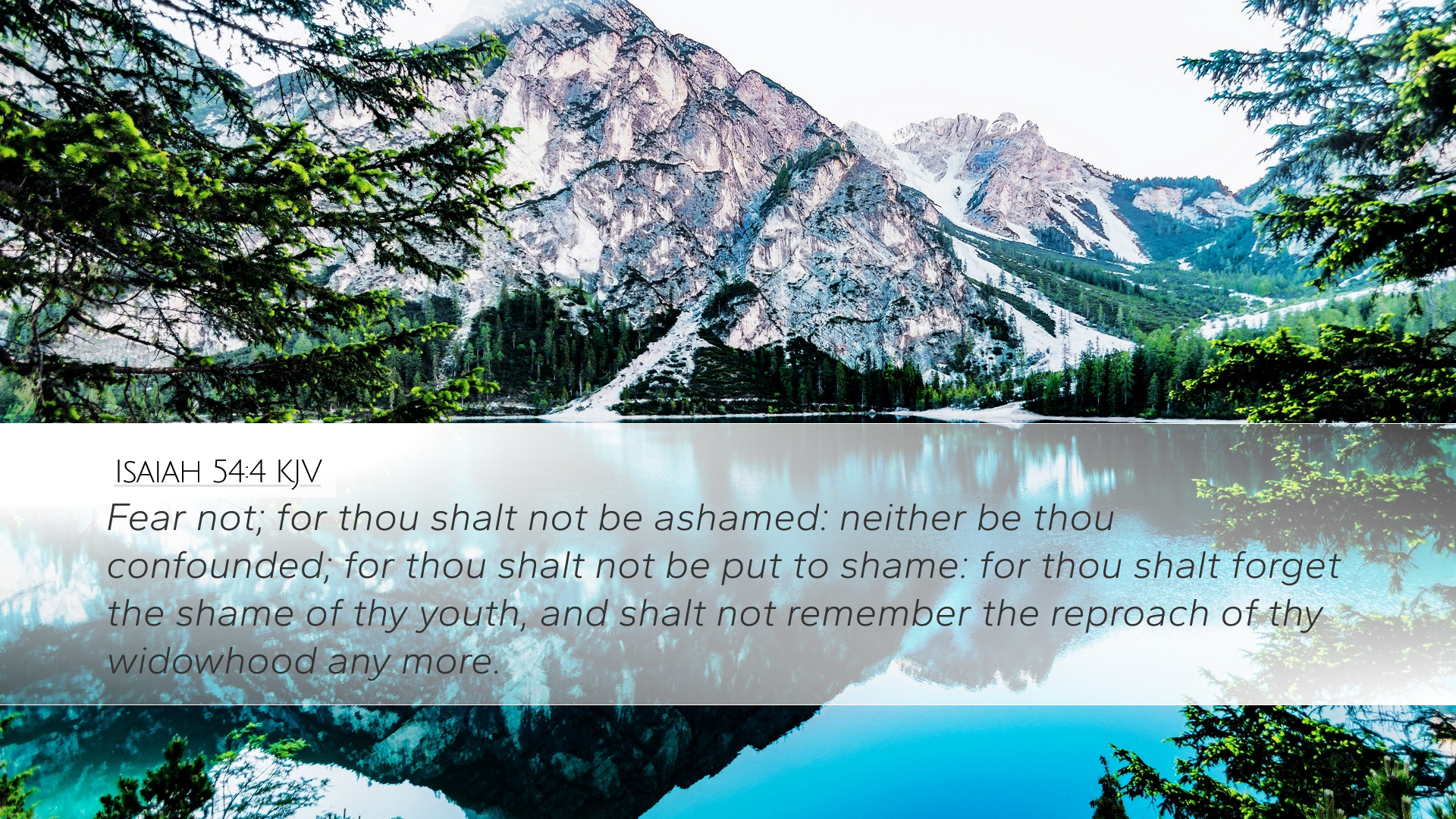Isaiah 54:4 - Commentary Summary
Isaiah 54:4 states, "Fear not; for thou shalt not be ashamed: neither be thou confounded; for thou shalt not be put to shame: for thou shalt forget the shame of thy youth, and shalt not remember the reproach of thy widowhood any more." This verse provides profound assurance and hope to the people of Israel, particularly in the context of their restoration after exile.
Contextual Background
To appreciate the depth of this message, it is essential to consider the historical and theological context. Following their profound sufferings, the Israelites were in despair, reminded of their failures and the judgment that led to their scattering. In this prophetic text, God speaks through Isaiah to lift their spirits and assure them of His enduring love and faithfulness.
Fear Not: A Call to Assurance
Isaiah opens with a powerful command: "Fear not" (Isaiah 54:4). This call is significant, as fear often paralyzes individuals and communities, particularly those who have suffered loss and disgrace. The phrase suggests a divine initiative aimed at alleviating anxiety and instilling confidence. As noted by Matthew Henry, God’s reassurances act as a balm for the troubled heart, reminding the people that their past does not define their future.
- Divine Assurance: The emphasis on fearlessness implies a transition from mourning to hope, enabling the believers to trust in God's providence.
- Transformation of Identity: With phrases like "thou shalt not be ashamed," the verse points to a complete transformation of identity; believers are encouraged to see beyond their past failures.
The Theme of Shame
The idea of shame is central in this verse. Albert Barnes notes that this reflects not only the societal shame of exile but also personal feelings of inadequacy. The Lord promises that not only will shame be removed, but it will be forgotten. This theme correlates with the New Testament understanding of redemption through Christ, where shame and reproach are overcome.
- Historical Shame: The shame referred to arises from both individual and communal failures, providing comfort that God's mercy is greater than their collective sin.
- Shame of Widowhood: As Adam Clarke describes, widowhood represents isolation and vulnerability. God’s promise reflects His maternal compassion towards those who feel abandoned or neglected.
Redemptive Purpose
This verse is also about hope for redemption and restoration. Adam Clarke emphasizes the forward-looking nature of this promise. The restoration foretold in Isaiah signifies a revitalization of not only the people’s fortunes but also their spirit and identity in relation to God. They shall "remember the reproach of thy widowhood any more," suggesting a renewal of covenant relationship, underscoring that God has not abandoned them despite their current state.
- New Relationships: God is portrayed not just as a deliverer but as a faithful partner, transforming their collective sense of abandonment to one of affectionate belonging.
- Hope for the Future: This verse serves as a beacon for believers, encouraging them to anticipate a future anchored in God’s promises rather than their present circumstances.
Implications for Contemporary Believers
The message of Isaiah 54:4 transcends its historical context, providing rich theological insight for today's church. The imperative to "fear not" resonates deeply with contemporary believers who grapple with personal shame and societal expectations.
- Overcoming Guilt: Past sins and failures can haunt believers; yet, God promises liberation from such burdens. Effective pastoral care should reflect this promise, helping congregants understand their identity in Christ.
- Community Restoration: Just as Israel was called to restoration, contemporary Christian communities are encouraged to embody grace, ensuring that no individual is left in shame.
Theological Reflection
This verse invites deep theological reflection on the nature of God as a redeemer who actively restores. The biblical narrative continually illustrates God’s desire to redeem and restore humanity despite its failings.
- God's Covenantal Love: The assurance embedded in Isaiah is not just for ancient Israel but extends to all who believe, mirroring Christ’s reconciling work through the cross.
- Living in Hope: Modern Christians are called to live in the light of this restoration, confidently progressing into the future as heirs of God’s promises.
Conclusion
Isaiah 54:4 is a profound affirmation of God’s unyielding love and redeeming power. It speaks hope to the seeker, assurance to the doubting, and peace to the fearful. The tapestry woven through this verse encourages pastors, students, and theologians alike to consider how God’s promises transform identities from shame to honor and how His faithfulness ensures that we can face the future without fear. In times of personal and communal distress, believers are called to remember these words, embracing the hope of restoration and renewal.


